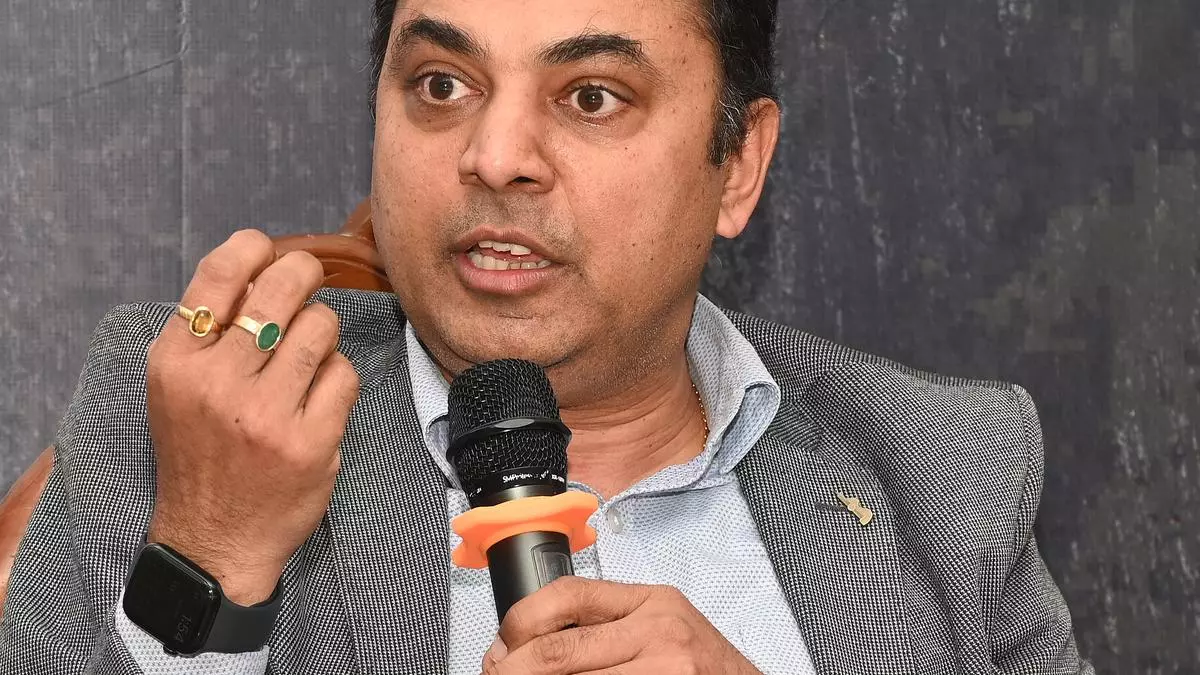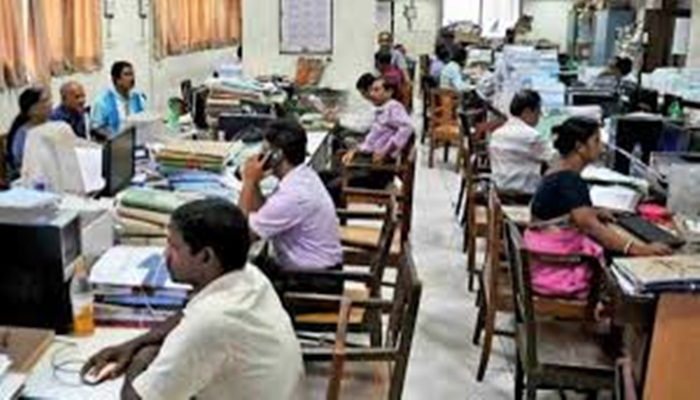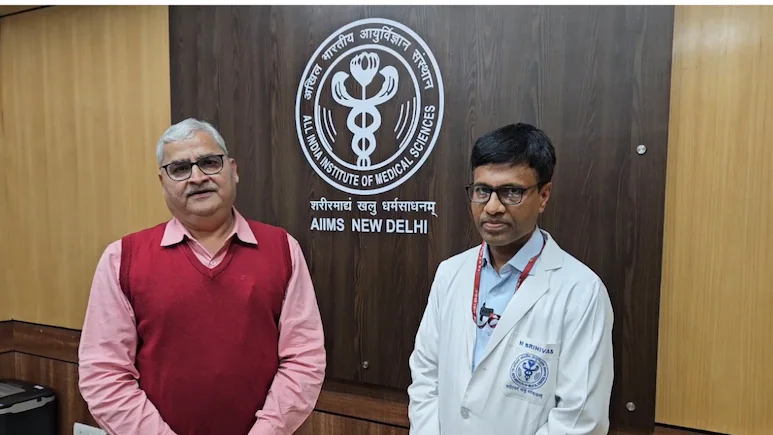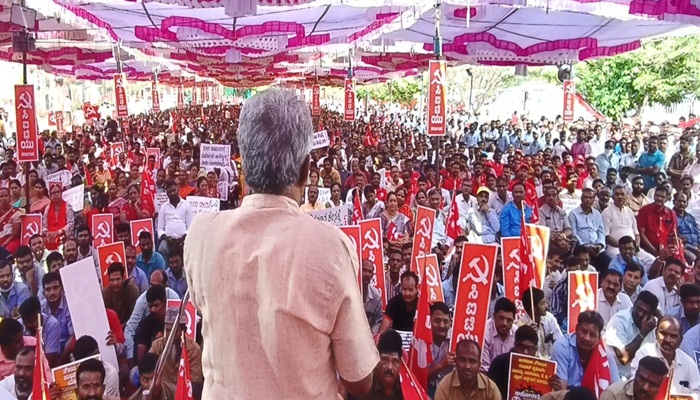Over 30,000 workers from different sectors across the southern Indian state of Karnataka mobilized to the capital Bengaluru in the first week of March to participate in the five-days-long agitation led by the state committee of the left-wing Center of Indian Trade Unions (CITU).
Starting on March 3, thousands of workers assembled in Freedom Park, carrying the red flags of the largest trade union federation in the state. Many stayed overnight, before making way for the next set of workers the following morning. This relay continued until March 7.
Karnataka State CITU President Varalakshmi described this demonstration as “a unique effort”, successfully mobilizing “the entire spectrum of the state’s working class – from domestic helpers and street vendors to the highly skilled workers from industries like aerospace, IT etc.”
A common demand raised by workers from across the sectors is a monthly living minimum wage of Rs. 31,566 for unskilled workers, with a 15% premium “for each higher level of skill”. They call for adjustments based on the price index, including a 6 paise (cents) per day allowance for every point rise.
Legislation granting permanent employee status to contract workers performing perennial jobs was another key demand raised, especially on March 6, when thousands of workers from both organized and unorganized sectors gathered.
Including giants like J.K Tyres and L.M Wind Power, workers from 115 privately owned factories came to protest that day. “In about 35 of these factories, there was a complete work stoppage as workers came to the protest after serving strike notice,” said Meenakshi Sundaram, Karnataka State CITU General Secretary.
Congress government must resist and repeal BJP’s anti-labor laws
In the shadow of the looming nationwide enforcement of the BJP-led central government’s reduction of 29 labor laws to four labor codes in 2020, protesting workers insisted that the Congress-led state government refuse to implement this dilution of labor laws in Karnataka.
They are already reeling under the adverse effects of the amendments to Karnataka’s Factory Act, Industrial Disputes Act, and Commercial Establishments Act by the previous BJP-led Karnataka government to increase work hours and ease the process of firing workers.
Although they protested these amendments while in opposition, the Congress party has not repealed them since taking the reins over the state government after winning the Legislative Assembly election in 2023. Instead, it has further curtailed workers’ access to the already diluted labor protections.
Under the cover of the slogan of providing “justice at the doorsteps of the people”, the government is referring labor disputes to civil courts. “The nature of industrial jurisprudence is different from civil jurisprudence. Every reference under the Industrial Disputes Act comes with a clear direction to complete the inquiry on the adjudicated matter within 6 months. But employers can drag on to no end in civil courts,” Sundaram complained.
“We are for justice at people’s doorsteps,” he clarified, adding, to ensure that workers can access justice, “we are demanding an exclusive labor court for every district.”
Even in its diluted and often inaccessible form, most legal protections for workers apply only to those in the organized sector, amounting to less than 20% of Karnataka’s workforce. But protesting alongside them were also thousands from the unorganized sector, raising their distinct occupational grievances.
Sanitation workers, outsourced or hired on temporary contracts by urban local bodies like municipalities despite 15-20 years of continuous service demanded the regularization of their jobs, protesting that they are being deceived of their rightful benefits of permanent employment.
Adversely affected by the government’s efforts to curtail tobacco consumption, workers manufacturing beedis, sleek local cigarettes hand-rolled in tendu leaves, demanded a monthly compensation of Rs. 6,000. Auto-rickshaw drivers called for the repeal of the Motor Vehicles (Amendment) Act 2019, also by the previous BJP-led state government, which has led to increased police harassment and high penalties eating into their meager incomes.
Dangerous and precarious work
Hundreds of plantation workers from the districts of Chikmagalur, Hassan, and Kodagu also joined the demonstration, demanding a daily minimum wage of Rs. 1,000. While coffee prices continue to rise, the workers growing the crop in the snake-infested plantations in the tropical evergreen forests on the hills of Western Ghats – risking their lives and limbs to attacks by elephants and other wild animals — earn less than Rs. 400 per day.
Their union leader Dharmesh also stressed the need for a Welfare Board, adding “an estimated three lakhs workers labor in the coffee plantations without protective gear or access to healthcare.”
Occupational safety was a key concern raised also by the headload workers union. “Headload workers start bearing heavy loads in their late teens. By the time they reach fifty, these knees are damaged. They cannot even squat on pit latrines anymore,” said their leader, Mahesh.
After a protracted struggle by the union demanding regulation of the load carried, implementation of the ILO’s Maximum Weight Convention has only just begun. But, he added, their occupation safety remains the main concern, followed by the lack of affordable housing in the cities, forcing them to live crammed in slums.
Construction workers, who had held their demonstration the previous day on March 5, also lamented unaffordable housing. “Throughout the summer heat, the monsoon rains, and the winter chill, we labor ceaselessly to lay roads and raise buildings for shopping malls, offices, and houses. But we have to live in make-shift shacks with leaky roofs over our heads,” Mahantesh, leader of the Construction Workers Federation of India (CWFI), said in his address to their demonstration.
“Many are even sleeping the nights on the streets, in bus stands, and on railway platforms, before returning to work in the morning”, Sundaram said in his address to the protest.
Urban poverty rooted in the agrarian crisis
The toilers enduring such urban travails are mostly migrants, forced to leave behind their families in their villages in search of precarious work in the cities amid a deepening agrarian crisis that is rendering rural livelihoods increasingly unviable.
“The Conference of Indian Industries estimates that 45 lakh people, mainly agricultural laborers, have migrated from rural to urban areas over the last three years in Karnataka,” Sundaram said. This distress migration, which began with the neoliberal reforms of the 90s, has accelerated in recent years due to the rampant acquisition of fertile lands for non-agricultural purposes, destroying agricultural livelihoods.
On the one hand, the government is forcibly acquiring farmlands and handing them over to private players through the Industrial Development Board. On the other, private industrialists are also directly acquiring land from farmers. The longstanding prohibition against such acquisition of agricultural lands by non-agriculturists was removed in 2020 by the previous BJP-ruled state government with an amendment to the Karnataka Land Reforms Act.
Calling it “anti-farmer”, Karnataka’s current Chief Minister Siddaramaiah, the leader of the opposition at the time the BJP government tabled the amendment in the state legislature, had torn up its copy and staged a walk-out, sloganeering against the BJP.
It has been nearly two years since he formed the state government. However, Siddaramaiah has not fulfilled his promise to repeal this amendment. Instead, the Congress government is taking advantage of it to continue facilitating the transfer of farmland to private industries, further displacing and immiserating the peasantry.
Unpaid wages
This cross-party policy of depriving and neglecting rural areas also reflects in the unpaid wages of employees of the Gram Panchayats, or village councils. From sweepers and water supply workers to accountants and data entry operators, they came in the thousands from across rural Karnataka to protest on the first day of this five-day-long demonstration on March 3.
With their wages overdue for over a year in many cases, they are struggling to make ends meet. However, invested in the upkeep of their village, and desperate to retain their government job amid an unemployment crisis, they nevertheless have continued to work, hoping that sooner or later they will receive their pending wages, at least in part, Sundaram explained.
“For many years, the state government had insisted that the Gram Panchayats should generate their own funds by collecting taxes, which has proven impossible. After a long struggle, the government agreed to fund a part of their salaries, but that should be regularized,” he said, reiterating CITU’s demand that the government should allot a budget of Rs. 380 crore to clear these dues and ensure timely payment of future wages.
Midday meal and Anganwadi workers insist on being treated as government employees
Unlike the Gram Panchayat employees, the cooked mid-day scheme workers who took their place in Freedom Park on March 4, are not even entitled on paper to minimum wages. Launched in 2001, the scheme, under which hot meals are served in government and government-aided schools, has been a critical intervention, increasing school enrollment and attendance, while combating malnutrition among children.
However, the predominantly women workers on whose labor this scheme is dependent are not even regarded as employees. Instead of wages, they are paid a pittance in the form of an honorarium.
“We are among the workers paid the lowest by the government,” Malini, leader of the midday meal workers union, said in her address to the demonstration. “Starting with an initial honorarium of Rs. 300 per month” almost two and half decades ago, “our pay has only now reached Rs. 3,700 a month,” rising by a hundred or two after each large protest over the decades. But “is it possible to survive on such a meager income?”
The government does not treat them as full-time workers, and maintains that their work hours are only four a day, having only to “cook hot meals and leave. But the reality of the demands placed on us are different,” she complained.
“We remain at school, long after the teachers have left. We must unload the food grains” when they arrive. “After cooking, we must clean the premises where the children eat and the classrooms where we have to deliver food to teachers who often wash hands on their plates,” she complained. These chores take well over six hours, often eight.
Their demand to be treated as employees entitled to minimum wage, rather than an honorarium, was also echoed on March 7, the final day of the protest, drawing almost 10,000 Anganwadi workers. These community-based workers have been critical for maternal and child health in the villages, the slums and the low-income colonies in cities.
Keeping track of pregnancies in their communities, they regularly visit expecting households to explain the health precautions and good practices to carrying mothers, deliver to them food grains and medicines, and monitor their health. Once the child is born, they monitor the infant’s health and promote breastfeeding and immunization, often having to convince reluctant or suspicious families of its importance. They also impart preschool education, teaching the alphabet, numbers, etc.
“From the time of pregnancy till the child grows to the age of six, we play a critical role at every stage,” said 56-year-old Vijaya from a district in north Karnataka where she has served as an Anganwadi worker for over 30 years. Studies have consistently shown that areas with active Anganwadi workers have substantially lower rates of maternal and child mortality, malnutrition, and stunting.
By “labeling us as ‘volunteers’ and paying a small honorarium” instead of wages, the government “is actually dishonoring our work. We demand the status of government employees with all the entitlements it accrues.”
“Increase taxes on the wealthy and ensure livelihood for the poor”
Campaigns in the lead-up to this mass demonstration from a cross-section of Karnataka’s working class began in late January, with regional workshops in the cities of Bengaluru, Belgaum, Gulbarga, and Mangalore for the unions’ cadres and office bearers from all 31 districts. Vehicle rallies, industry-wise and cluster-wise meetings, and other weeks-long campaigns followed throughout February in several districts.
The police issued a notice to CITU, rescinding the permission to campaign in Bengaluru, “threatening to seize the microphone and the rickshaw” in which its activists were going around the city to raise awareness about the protest, recalled Sundaram in his opening address.
“Permissions are readily given” for loud religious processions of all kinds on main roads, but “only when workers want to march on the same roads to demand their wages, the government is suddenly concerned about traffic jams,” he complained.
Nevertheless, with tens of thousands protesting on a relay, the state government was compelled to send officials on each of the five days to utter some reassuring words and receive the memorandum, which raised 37 demands.
Among the demands are:
- the extension of the work guarantee under the Mahatma Gandhi National Rural Employment Guarantee Act (MGNREGA) from 100 to 200 days, at a minimum wage of Rs. 700
- an urban employment guarantee act along similar lines
- an annual “paid menstruation leave of 12 days for all women workers”
Refuting the claim that the government does not have the money to meet these demands, CITU has demanded an end to the “tax concessions and subsidies” given to large domestic and foreign corporations.
“If the richest 1% in the country are taxed just 2% on their assets, the GST can be slashed, petrol prices can be reduced, free education can be rolled out for everyone,” Sundaram added in his opening address, reiterating the Memorandum’s subject: “Increase taxes on the wealthy and ensure livelihood for the poor”.
CITU state president Varalakshmi added that Karnataka’s workers are not simply raising narrow sector-specific economic demands, but are fighting against the state’s pro-corporate policies to replace them with the “alternative pro-people policies proposed in the 37 points charter.”





















